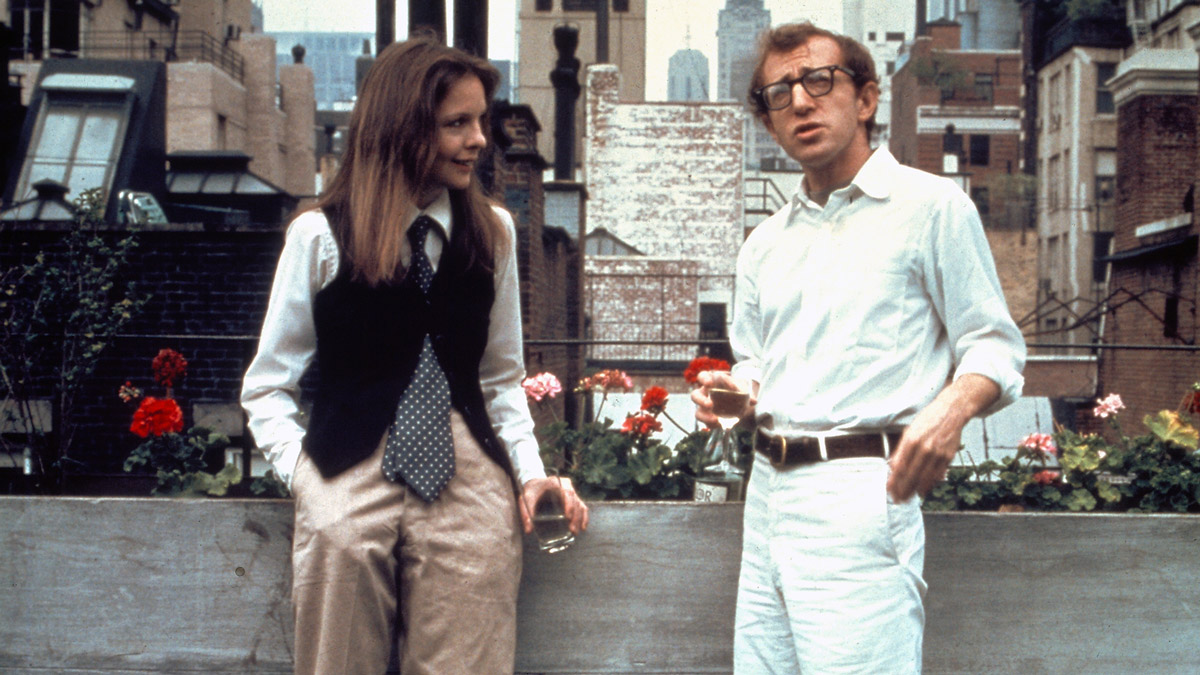
(c) Photofest / Getty Images
``Annie Hall'' Woody Allen and Diane Keaton, the beginning of their friendship
2020.09.23
Characters that reflect Allen's life philosophy
The story is about the encounter and parting of a man and woman, and while the story is not particularly new, its structure was novel. Rather than arranging the story in chronological order, the story is arranged in fragmented episodes, and is shaped like a reminiscence of the main character , Alvy. (It has also been carried over into "Summer " (09) etc.)
The first person to appear is Allen himself. Suddenly, he starts speaking to the camera: ``Actually, I broke up with my girlfriend Annie.I couldn't sort out my feelings after that.I'm not the type of person to get depressed.'' And Alvy's lost time is told. The first thing that appears is an episode from childhood. The story is told that she grew up in a common Jewish family near an amusement park in Coney Island, New York (Coney Island was later used as the setting for the story in `` The Wonder Wheel ''). ).
The next episode shown is an episode in an elementary school classroom. Alvy is criticized by his teacher for kissing a girl. The teacher who appears has a scary look on his face, and the memories of Allen, who admits to hating school, are entrusted to him.
Regarding his childhood, Alvy says, ``I was always deeply immersed in the world of imagination. That's why I couldn't distinguish between reality and fantasy.'' In the aforementioned `` Woody on Allen ,'' Allen acknowledges the significance of this line: ``It's a big theme in my movie.''
"Blue Jasmine" preview
I can't distinguish between reality and fantasy. This is a characteristic of the characters who appear in many of Allen's films, including `` The Purple Rose of Cairo '' (1985), ` `Midnight in Paris '' (11), and `` Blue Jasmine '' (13). However, it depicts the sadness of a person who lives between reality and fantasy.
Also, the lines that Alvy speaks to Annie at the bookstore may be entrusted with his outlook on life. ``My outlook on life is pessimistic.There are ``miserable lives'' and ``miserable lives'' in this world.A ``miserable life'' is burdened with insurmountable difficulties.For example, people with impaired eyesight or physical They are free people. I can't even imagine what kind of life they lead. Everyone experiences a ``miserable life.'' That's why we should be grateful that we were able to choose a miserable life.''
Because the line was written in the 1970s, it seems problematic from a modern politically correct perspective, but on the other hand, it is also a line that is typical of the cynical Allen (as a film director, he was in a difficult situation in America). What does Allen think of the meaning of this line now?
The setting in which Alvy is a comedian is reminiscent of Allen himself, and the footage of TV shows and university talks that appear in the middle of the film uses footage from when Allen himself appeared. Also, like Alvey, Allen has been divorced twice and was in a real-life relationship with Diane Keaton, who plays Annie. The fact that Allen is of Jewish descent and Annie is of Anglo-Saxon descent is also true to reality.
When asked by Annie, "Did you take a shower (at the tennis club)?", Alvy replied, "I never take a shower in public places. I don't get naked in front of other men." Allen answers, but according to a biography written by David Evanier, Allen himself has a policy of not taking off his clothes in the presence of other men.
There is a scene in which the lovers meet in front of a movie theater, where a Bergman film ( The Girl in the Mirror (1976)) is being shown, and Allen himself admits to being a fan of Bergman's films.
In the second half of the film, there is a scene where Alvy and his friends visit Los Angeles, but like Alvy, Allen is known to not have a good impression of Los Angeles.
Looking at the film as a whole, there are many lines and scenes that remind us of similarities to Allen's A Very Private Affair, which gives the film a hidden appeal.

